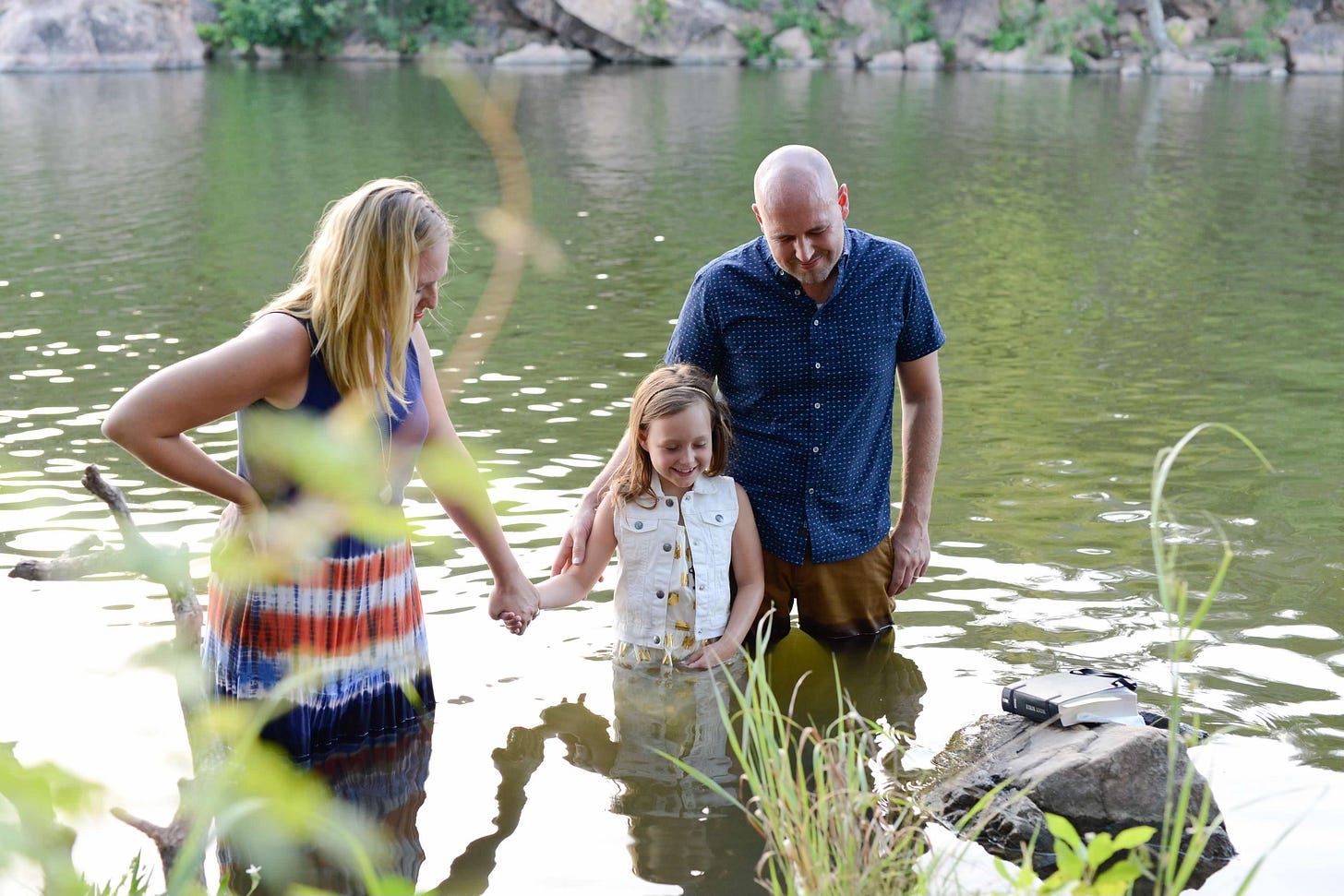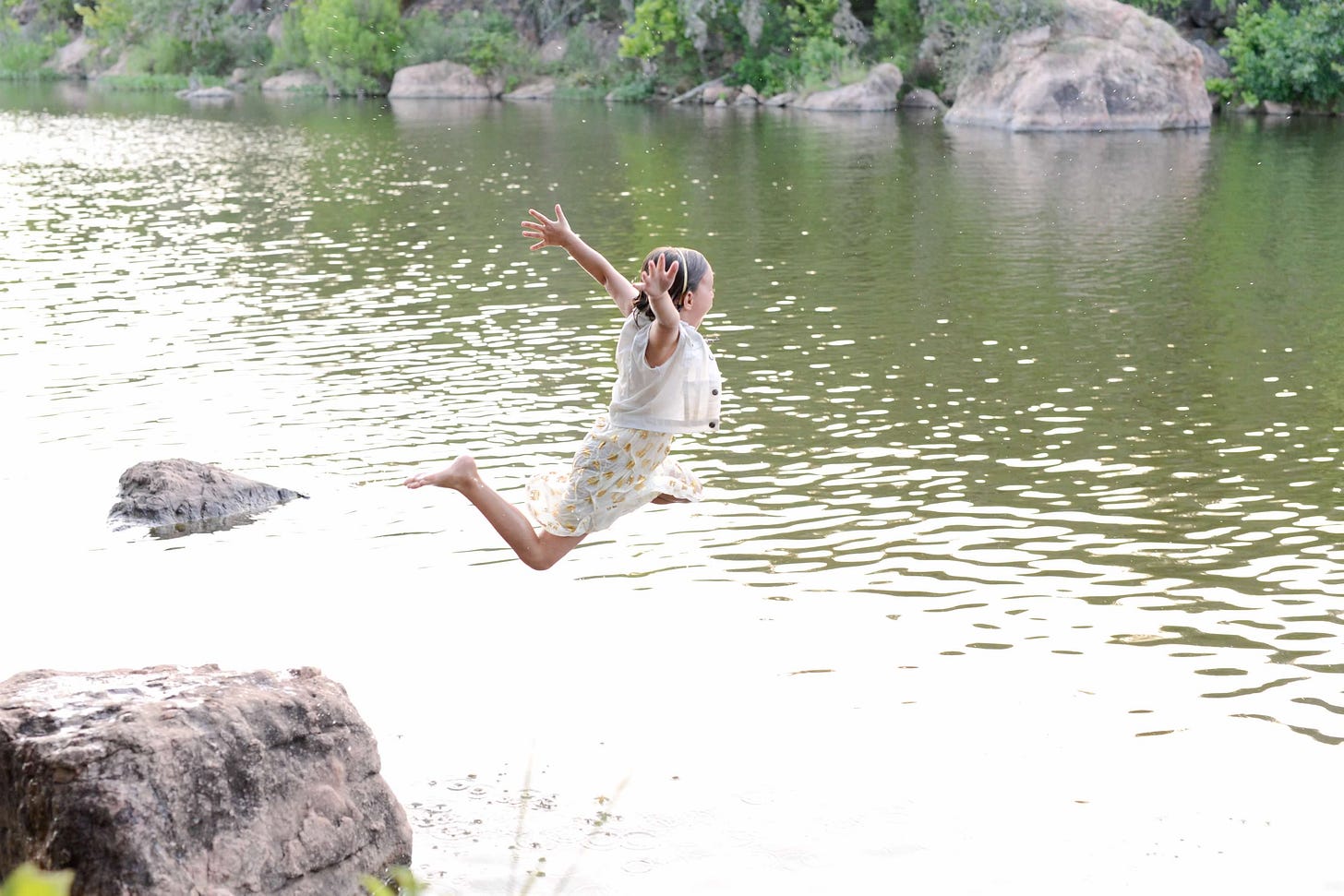The End?
Chapter 17: To New Life
So we’ve reached the end of Season 1, “Because He was Here.”
Because Bobby was here…
Because Yahweh was here…
Everything is better because I have loved and been loved. Everything is better because I was never alone.
All the Things
Psalm 139. This Psalm is one of a handful that keep popping up in my story, like favorite songs on the mixtape of my life. It’s not a deep cut—lots of people count this Psalm among their favorites (I share it with London in this scene). But it means something to me, because I often feel unseen, and because I was not “knit together in my mother’s womb” intentionally. Accidental babies can feel like accidents (full stop), but the God of Psalm 139 says otherwise. He knows me. He sees me. He’s close. These are reassuring truths.
The part about London’s prayer in the water just before being baptized—London’s words kind of haunted me for years. Did she understand? Did she not understand? It wasn’t until recently that I started to understand myself that London had been wise all along.
It’s been abundantly obvious watching London grow up that she has surrendered her life to Christ and that she has been resurrected into an eternal life. She’s a living sacrifice if I ever saw one. This fall she’ll enter the Coast Guard, because she feels like God’s telling her to. I’ve asked her if she’s afraid. It’s dangerous work. But she says, she’s always saying, “To die doing what God’s asked you to do wouldn’t be a bad thing.”
As I said, “So even if she dies, and she will die, she’ll never die, will she?”
I didn’t know what I was doing when I started in on the Mary Oliver poem. It’s SO popular, but I had this feeling that I wanted to push back on it. It wasn’t until I’d been writing for a few hundred words that I discovered these twin anathemas: the culturally held beliefs that 1) life is scarce or limited and 2) that we have control over the aim of that one life. These creep into the Christian worldview as much as they proliferate in the broader culture, and I just can’t with it.
Understanding the unlimited nature of our new-in-Christ life is absolutely fundamental to living it properly. If you think you can break something you handle it carefully, but the Christian life was never meant to be handled carefully. It’s a pedal to the metal sort of thing. Take the car off-road. Be curious. Be generous. Spend it all. Give your whole self away. Make a mistake? Start again. And again. And again. This is how we truly live—by not being afraid to die.
And then, the appearance of control. The idea that you are in charge of your life. You are not, and you cannot be. It’s God who will determine the course of your life. And it should be God who directs your steps.
Most Christians live life this way:
1. Figure out where God wants me to go, who God wants me to be, etc.
2. Make a plan to get there.
Sorry guys; that’s all wrong. Here’s the actual way to live:
1. Get close to Yahweh. Be filled with His Spirit. Keep your eyes on Jesus. And go where He tells you to go, one step at a time. Let Him get you there. Where? Wherever.
You don’t need a ten year plan; God has one. You don’t need goals. Jesus is your goal. Forever with Yahweh is your goal. It’s the only one you need. Let Him lead.
The “How to Read Your Life Like a Short Story” lecture is in the process of becoming a workshop to help God’s children see the stories He’s writing in their lives. Interested? Leave a comment!
Just after the lecture in which I discovered the third bunny story, my family traveled to The Lake District in the north of England where we attended a print fair with some of the UK’s most talented artists. We turned a corner in the very crowded main hall, and there it was, this linocut that I now have hanging in my living room.
It seemed like the perfect altar.
“Are my stories actually His stories?” They are. What does that mean? How does that affect the way I understand them? How does it affect the way I live them? These are good questions to ask.
What I know is that grief made me selfish and self-absorbed—hardship does that to people sometimes. Now, as I walk out of that miasmic season, I’m trying to keep my eyes on Him.
The reason I told this story was to tell this part—that God (and God alone) saved me. All credit, all glory, every bit of attention and awe and good feelings, all of it belongs to Him. I wrote 17 chapters just so that when I said this one sentence you’d listen:
“But you, Lord my God,
brought my life up from the pit.”
And finally, London’s vision. No, that wasn’t a metaphor or a story. She saw it and heard it. And now she’s obeying. And I couldn’t be more proud.
So that’s the end of Season 1 of The Happiest Saddest People. Thank you for listening.
Will there be a season 2? Lord willing. I’m already sketching out drafts. The story will be entirely new, but it’ll still be a memoir told over multiple episodes. This time we’ll jump into parenting, home ownership, financial “ruin,” church pain, marriage tension, the HGTV dream home sweepstakes, and, in all of it, an attempt to understand the faithful love of the Lord.
A season of The Happiest Saddest People costs about $90,000. If you’re interested in hearing season 2, you can make a donation HERE.
The End (or maybe To Be Continued),
JL






Wow what a gorgeous little girl so nice